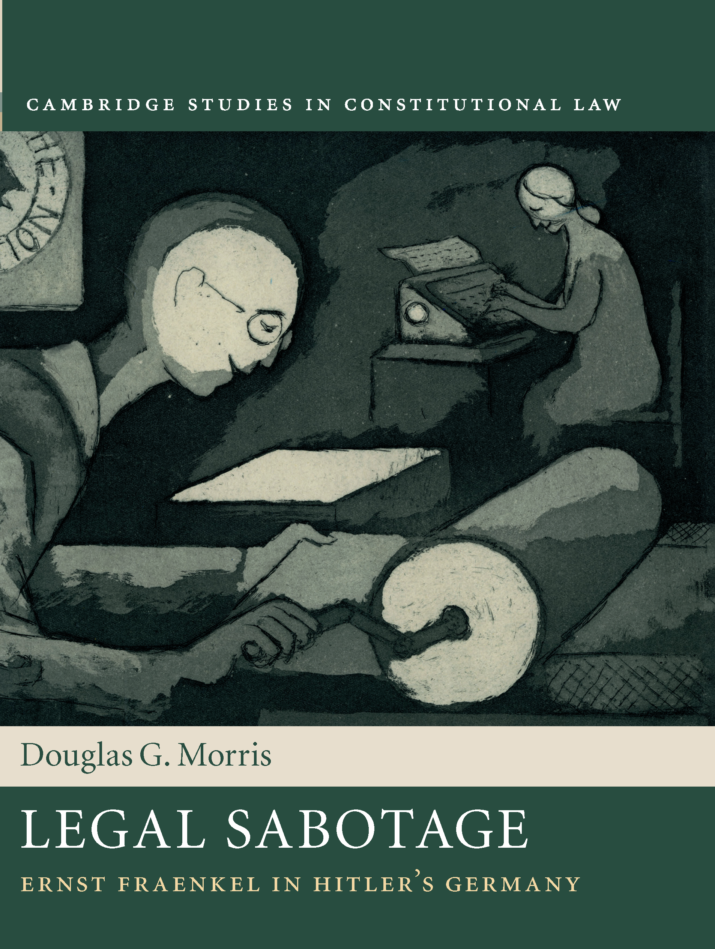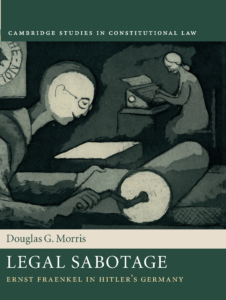

After emigrating to the United States in 1941, the German Jewish lawyer Ernst Fraenkel published The Dual State: A Contribution to the Theory of Dictatorship, a seminal analysis of Nazi Germany that he had drafted while practicing as a lawyer in the Third Reich. Fraenkel’s study argued that the Nazi regime was a “dual state” characterized by the tension between the remnants of the traditional legal order and the new realm of extrajudicial power exercised mainly by the Gestapo and the SS (Schutzstaffel). Although Fraenkel went on to play a major role in shaping the discipline of political science in postwar West Germany through a professorship in Berlin, the reception of The Dual State has included long periods of neglect. Recently, Fraenkel’s work on the Nazi state has been attracting scholarly attention again. In 2009, the German political scientist Simone Ladwig-Winters published a biography of Fraenkel. In 2017, Oxford University Press issued a new edition of The Dual State, with an excellent introduction by the legal scholar Jens Meierhenrich, whose book-length study of Fraenkel’s work, The Remnants of the Rechtsstaat: An Ethnography of Nazi Law, was published the following year. While Meierhenrich’s book elucidates The Dual State’s place in intellectual history and law-and-society scholarship, Douglas Morris’s recent monograph, Legal Sabotage: Ernst Fraenkel in Hitler’s Germany, explores Fraenkel’s work from a different angle, examining the origins of his dual state theory in his legal practice in Nazi Germany from 1933 to 1938.
Combining his skills as a German legal historian and a practicing defense lawyer, Morris has performed the truly remarkable feat of piecing together and analyzing Fraenkel’s legal practice in the Third Reich on the basis of extremely limited and scattered historical evidence. After an initial chapter sketching the situation of Jewish lawyers in Nazi Germany, Legal Sabotage’s central second chapter, “Fraenkel as a Social Democrat practicing law in Nazi Germany,” discusses how Fraenkel managed to elude disbarment—first, for being Jewish, then for supposed communist sympathies—and carefully reconstructs nearly a dozen cases in which Fraenkel served as defense counsel, primarily for victims of political persecution. In addition to providing remarkable insights into the functioning of the Nazi judicial system and the room for maneuver still available to courageous and skillful defense lawyers, Morris’s account of Fraenkel’s legal practice in Nazi Germany delivers a compelling explanation of how Fraenkel developed his theory of the dual state. The theory’s origins in Fraenkel’s legal work are of special interest due to a peculiar circumstance. Fraenkel’s 1941 edition of The Dual State cited only published legal sources and made no reference to his own Nazi-era legal work. Yet in his preface to the 1974 German edition Fraenkel made it clear that he had written his book to “make sense,” theoretically, of experiences that “stem[med] mostly … from [his] work as a practicing lawyer in Berlin in the years 1933-1938.”[1] The reason why he had not referred to his own legal experiences in the book was that this would have placed him and his clients in danger.
Taking his cue from Fraenkel’s postwar comments on the origins of his book in his legal practice, Morris skillfully shows how the dual state thesis was inspired by a particular case. In the so-called “Delatowsky case” of 1936, Fraenkel represented former employees suing for severance pay from a funeral association that had been taken over by the Gestapo and refused to honor the association’s previous contractual obligations. The lawyer for the defense argued that the previous organization had been dissolved and reconstituted as a new one, which had no obligation to uphold prior agreements. Fraenkel objected that the Gestapo could not create a private organization “out of nothing,” to which the defense responded that “any action the Gestapo required or deemed necessary was lawful.” When Fraenkel asked whether the Gestapo could even dissolve a marriage, the opposing lawyer replied, “Without doubt.” It was this claim that all Gestapo actions were lawful by definition that led Fraenkel to conceive of the dual state theory, which was also influenced by the court case’s stunning outcome. Although the court ruled in favor of Fraenkel’s clients, the Gestapo seized the court-ordered severance pay and deposited it into the coffers of the Prussian state. The expectation that court judgments were final was shattered.
Fraenkel’s dual state theory explained the legal-political system of the Third Reich as the interaction of two different parts of the state apparatus: the “normative state,” which comprised the legal order based on both pre-Nazi and Nazi law, and the “prerogative state,” which consisted of the newly created realm of arbitrary, extrajudicial power, which empowered organizations such as the Gestapo and the SS to indefinitely detain people in concentration camps without charge—and even torture or kill them without legal repercussions. Postwar apologists for the German judiciary sometimes drew on Fraenkel’s theory in order to falsely equate his normative state with the rule of law, so that they could claim that German judges had upheld the rule of law. Morris, by contrast, makes it clear that Fraenkel’s concept of the normative state did not represent the rule of law—which Morris defines as “a liberal legal system based on general laws, equality before the law, and fair application of laws by neutral judges” (103)—but a post-1933 legal system that was compromised both by Nazi legislation that infringed on rule-of-law principles and by its capitulation to the arbitrary powers of the prerogative state.
In addition to explaining how Fraenkel’s theory arose from his legal practice, Morris also examines how his theory affected his legal practice. Whereas Fraenkel’s thinking on the matter had crystallized in a labor law case, the realization that the prerogative state could simply ignore court judgments by taking extrajudicial action also had crucial implications for Fraenkel’s defense of political opponents in criminal trials. As Morris shows, Fraenkel made a deliberate decision in several cases not to argue for a client’s innocence because he anticipated that, even if the court acquitted the defendant, there was a substantial risk that the Gestapo would nevertheless arrest him. Instead, Fraenkel accepted the presumption of punishment and focused his efforts on minimizing its severity. As Fraenkel put it in his 1974 preface to The Dual State, he conceived of his legal work as that of a kind of railroad “switch man,” who ensured that a case remained under the auspices of the normative state by “making sure that … clients were punished in a court of law.”[2] This way, at least, they would serve their sentence in a regular prison, thus forestalling the far more dangerous prospect of being whisked off to a concentration camp.
Morris’s book provides a much more nuanced and wide-ranging analysis of Fraenkel’s activities and writing during the Third Reich than can be conveyed in this short review. One of the book’s major contributions is to show that, besides continuing his legal practice, Fraenkel participated in illegal resistance work and published five essays in socialist underground publications, whose arguments—especially regarding the justification of resistance—Morris carefully analyzes. Morris also examines Fraenkel’s attempt to revive an older German tradition of “rational natural law,” which Fraenkel opposed to the Nazis’ irrational version of natural law. In the book’s final chapter, Morris provides instructive comparisons of Fraenkel’s analysis of the Third Reich with those of several other figures. The most important among these is Fraenkel’s former law partner Franz Neumann, who had left Germany in 1933, and published his own influential analysis, Behemoth: The Structure and Practice of National Socialism 1933–1944, in exile in New York in 1944. For Neumann, rationality and generality were essential attributes of law. Hence, law did not exist in Nazi Germany because “law [was] now exclusively a technique of transforming the political will of the leader into constitutional reality” (178). It followed that for Neumann the Third Reich was “a nonstate, a chaos, a rule of lawlessness and anarchy” (184). Fraenkel’s analysis was subtler. Unwilling to embrace Neumann’s notion that courts and statutes could completely lose the character of “law,” Fraenkel carefully analyzed the particular characteristics of the formal Nazi legal system and its relationship with the extrajudicial authority of the increasingly powerful SS empire.
By showing how Fraenkel’s nuanced analysis grew out of his legal practice in Nazi Germany, Morris greatly advances our understanding of Fraenkel’s “dual state” theory. Never hagiographic, he probes the moral dilemmas that Fraenkel faced both in his legal practice and in his clandestine resistance work. His book is a must-read for anyone interested in political theory, the Nazi legal and political system, the circumscribed freedom of action available to lawyers in the Nazi justice system, and the difficulties and dilemmas of resistance under a dictatorship. It would be wonderful if all these topics were of purely historical interest. Alas, they seem to be becoming more relevant by the day.
Richard F. Wetzell is a Research Fellow at the German Historical Institute in Washington DC. His publications include Beyond the Racial State: Rethinking Nazi Germany (co-edited, Cambridge UP, 2017), Crime and Criminal Justice in Modern Germany (Berghahn Books, 2014), and Inventing the Criminal: A History of German Criminology, 1880-1945 (UNC Press, 2000). He is currently working on a study of racial science and Nazi biopolitics (1933-1939) and a history of penal reform in modern Germany (1870-1970).
Legal Sabotage: Ernst Fraenkel in Hitler’s Germany
By Douglas G. Morris
Publisher: Cambridge University Press
Hardcover / 344 pages / 2020
ISBN: 978-1108835008
References
[1] Ernst Fraenkel, “Preface to the 1974 German Edition” [trans. Jens Meierhenrich], in: Fraenkel, The Dual State: A Contribution to the Theory of Dictatorship, edited with an Introduction by Jens Meierhenrich (Oxford: Oxford UP, 2017), xv.
[2] Fraenkel, “Preface,” xix.
Published on March 23, 2022




